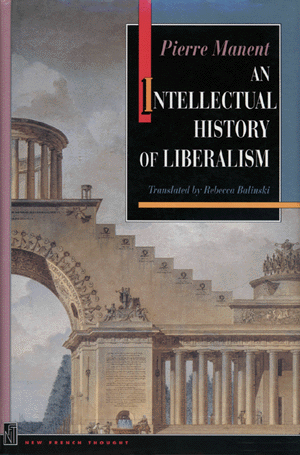An Intellectual History of Liberalism. Translated by Rebecca Balinski, with a foreword by Jerrold Siegel. Princeton: Princeton University Press, 1995. Originally published as Histoire intellectuelle du liberalisme: Dix leçons (Paris: Calmann-Lévy, 1987). Published in Brazilian as História intelectual do liberalismo: dez liçoes (Rio de Janeiro: Imago, 1990). Published in Polish as Intelektualna historia liberalizmu, trans. Marian Miszalski (Lódz: Kurs, 1990; Krakow: Arcana, 1994). Published in Italian as Storia intellettuale del liberalismo, trans. L. Caracciolo di San Vito (Rubbettino, 2010).
Highlighting the social tensions that confront the liberal tradition, Pierre Manent draws a portrait of what we, citizens of modern liberal democracies, have become. For Manent, a discussion of liberalism encompasses the foundations of modern society, its secularism, its individualism, and its conception of rights. The frequent incapacity of the morally neutral, democratic state to further social causes, he argues, derives from the liberal stance that political life does not serve a higher purpose. Through quick-moving, highly synthetic essays, he explores the development of liberal thinking in terms of a single theme: the decline of theological politics.
The author traces the liberal stance to Machiavelli, who, in seeking to divorce everyday life from the pervasive influence of the Catholic Church, separated politics from all notions of a cosmological order. What followed, as Manent demonstrates in his analyses of Locke, Hobbes, Rousseau, Guizot, and Constant, was the evolving concept of an individual with no goals outside the confines of the self and a state with no purpose but to prevent individuals from dominating one another. Weighing both the positive and negative effects of such a political arrangement, Manent raises important questions about the fundamental political issues of the day, among them the possibility of individual rights being reconciled with the necessary demands of political organization, and the desirability of a government system neutral about religion but not about public morals.
Tocqueville: Liberalism Confronts Democracy
François Guizot: The Liberalism of Government
Conclusion
Montesquieu and the Separation of Powers
Hobbes and the New Political Art
Benjamin Constant and the Liberalism of Opposition
Machiavelli and the Fecundity of Evil
Liberalism after the French Revolution
Locke, Labor, and Property
Europe and the Theologico-Political Problem
Online:
Amazon
Google Books

